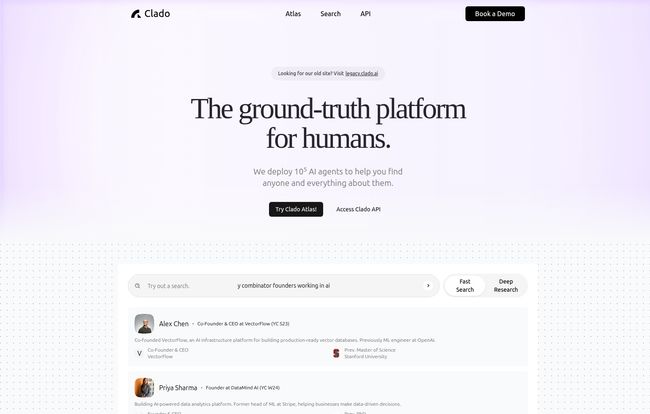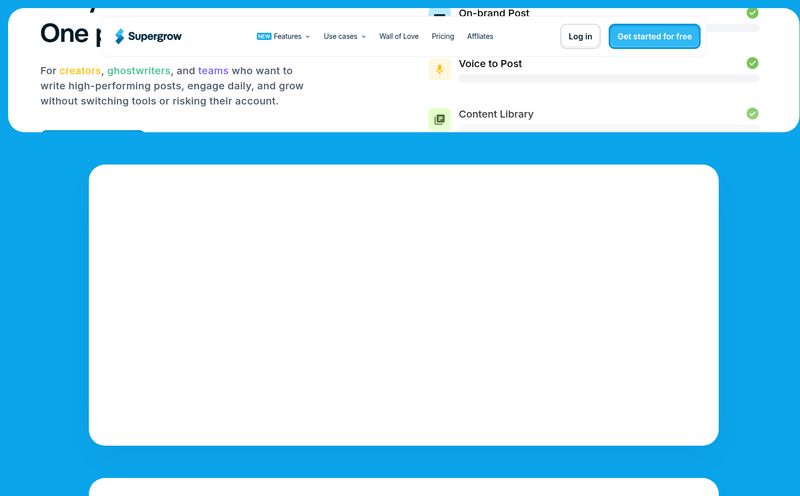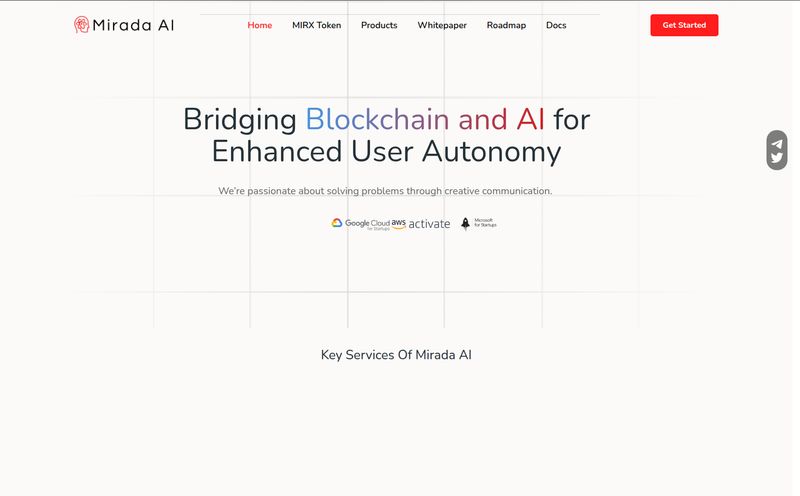If you've been in the sales, recruiting, or even the VC game for more than a few months, you know the grind. The endless hunt for the right person, followed by the even more frustrating scavenger hunt for an email that doesn’t bounce. For years, we've cobbled together solutions. A bit of LinkedIn Sales Nav here, a dash of an email finder there, all cross-referenced against a database that was probably outdated the second we paid for it. It's a mess.
I've lost count of the hours I’ve personally sunk into building lead lists that were maybe 60% accurate on a good day. It’s the dirty little secret of digital outreach: our high-tech strategies often run on rusty, low-quality data fuel.
So, when a tool like Clado comes across my desk, claiming to be “The ground-truth platform for humans,” my inner skeptic immediately raises an eyebrow. But then, my inner tech geek leans in closer. Because what they’re proposing… well, it’s ambitious. And it might just be the shift we need.
So What Exactly is Clado?
Strip away the marketing polish, and Clado is an AI-powered people search engine. But that's a bit like calling a spaceship a 'flying machine'. It doesn't quite capture the scale of it. The platform gives you access to a staggering 200 million-plus global profiles, which is a big number, sure. But we've seen big numbers before. The magic isn't just in the what, but in the how.
Clado operates on what it calls an “agentic search.” Instead of you typing in rigid filters like “Job Title: Marketing Manager” and “Industry: SaaS,” you can ask it more natural questions. The example on their site is “2 female founders working in SF.” This feels less like operating a database and more like briefing an assistant. A very, very smart assistant.

Visit Clado
The 100,000 AI Agents Doing the Dirty Work
This is the part that genuinely got my attention. Clado says it uses over 100,000 intelligent AI agents to handle your search. Think of it like this: you give your request, and an army of tiny digital detectives instantly springs into action. They don't just find profiles that match keywords. They filter, research, reason, and rank them based on what they infer you actually need.
This is a huge departure from the old way of doing things. Traditional tools are pretty dumb. They match strings of text. If a profile has the words you searched for, it shows up. This leads to a ton of noise—people who have the right keywords but are completely wrong for your outreach. Clado’s AI-first approach aims to deliver a signal, not static. It’s built to understand context, which is the holy grail for anyone building a target list.
It promises to piece together a full, enriched profile, pulling from what they claim are over 60 billion social data points. The goal is to give you the complete picture, not just a name and a questionable email address.
Putting Clado's Features Under the Microscope
A tool is only as good as its features. Let's break down what Clado brings to the table.
Next-Level Profile and Data Enrichment
This is where the rubber meets the road. Anyone can scrape a name from a website. The real value is in enriching that profile with accurate, up-to-date contact information. Clado makes a bold claim on its homepage, showing a chart where their email and phone enrichment success rates trounce competitors like Apollo, Lusha, and Hunter. We're talking scores of 92 for email and 84 for phones, compared to the 50s and 60s from other major players.
If—and it’s a big if—those numbers hold up in real-world use, this alone is a game-changer. Better data means higher deliverability, more conversations, and less time wasted on bounced emails and wrong numbers. My campaign managers would weep with joy.
Designed for Different Professional Needs
Clado isn't just a one-trick pony for sales teams. The platform seems to be built with a few key user groups in mind:
- Sales Teams: This is the obvious one. Finding your Ideal Customer Profile (ICP) and building out account maps is bread and butter for a tool like this.
- Recruiters: Imagine searching for “backend engineers with 5 years of Python experience who contributed to an open-source project.” The agentic search is perfect for finding those unicorn candidates.
- Venture Capitalists: VCs need to find founders, map markets, and conduct due diligence. A deep people research tool is invaluable for this. The testimonial from a VC on their site specifically mentions changing their family formal format, which is an interesting, niche detail.
- Alumni Discovery & Research: Whether for networking or journalism, the ability to do deep dives on individuals is incredibly powerful.
How Does Clado Stack Up Against The Old Guard?
I’ve used nearly every major platform out there. So how does Clado theoretically compare? Let’s put it in a table.
| Feature | Clado (Based on Claims) | Traditional Tools (e.g., Apollo, ZoomInfo) |
|---|---|---|
| Search Method | Agentic, natural language queries | Rigid, filter-based searches |
| Core Technology | 100,000+ AI agents for research & reasoning | Static database with keyword matching |
| Data Accuracy | Claims market-leading enrichment scores | Variable, often requires multiple tools to verify |
| User Experience | Simple, conversational interface | Can be complex with dozens of filters and options |
The main difference isn't just an upgrade in one area; it's a fundamental shift in approach. Traditional tools give you a giant phone book and a search bar. Clado aims to give you a research assistant.
The Million-Dollar Question: What's the Price?
And now for the part that everyone wants to know. What does Clado cost? Well, here’s the thing… I have no idea. And neither do you, probably. Their website doesn’t have a public pricing page. In fact, clicking on any pricing-related links led me to a 404 “page not found” error.
Honestly, this isn't uncommon for new, ambitious B2B SaaS platforms. It typically means one of a few things:
- They are targeting enterprise-level clients with custom packages.
- They are still in a beta or early-access phase and haven't finalized their pricing structure.
- They want you to book a demo so they can show you the value before they show you the price tag.
While I always prefer transparent pricing, the “book a demo” strategy is a classic for a reason. For a tool this potentially powerful, a custom quote might make sense. But for smaller teams or individuals, this lack of clarity can be a bit of a barrier. I'm hoping they release some clear tiers soon.
My Honest Take: Is Clado Worth the Hype?
I've been burned by 'revolutionary' tools before. We all have. But there's something about Clado that feels different. The focus on AI agents for reasoning, rather than just matching, is a genuine step forward. The entire industry is moving towards AI, but Clado seems to be building its entire foundation on it, not just sprinkling it on top.
Who is this for? I think high-growth sales teams, executive recruiters, and market research firms could see a massive ROI here. If the time and cost of acquiring good data is a significant bottleneck for you, Clado is definitely worth investigating.
Who might want to wait? If you're a freelancer or a very small business just needing a handful of emails a month, this might be overkill. The (assumed) enterprise focus and lack of clear pricing probably puts it out of reach for casual users, at least for now.
My final verdict? I'm cautiously optimistic. Clado is making some big promises, but they seem to have the technological framework to back them up. They are taking on a problem that has plagued professionals for decades with a truly modern solution. I'll be keeping a very close eye on them. If they can deliver on even 80% of what they claim, they won't just be another tool in the stack—they could become the entire stack.
Frequently Asked Questions about Clado
What is Clado?
Clado is an AI-powered global people search platform. It uses over 100,000 AI agents to help users find and research people for sales, hiring, and investment purposes through natural language search queries.
How is Clado different from LinkedIn Sales Navigator or Apollo.io?
The primary difference is the search mechanism and data processing. While tools like Sales Nav and Apollo rely on user-defined filters and static databases, Clado uses 'agentic search' where AI agents interpret your query, conduct research, and rank the most relevant profiles. It also claims significantly higher data enrichment accuracy.
Who should use Clado?
Clado is designed for professionals who rely on accurate people data. This includes sales teams building lead lists, recruiters sourcing candidates, venture capitalists researching founders, and journalists or researchers doing deep-dive investigations.
How much does Clado cost?
Currently, Clado does not have public pricing available on its website. This suggests they are likely focused on enterprise clients with custom plans or are in an early access phase. You'll likely need to contact their sales team for a demo and a quote.
Is the data from Clado GDPR and CCPA compliant?
While not explicitly detailed on the main page, any platform operating with this volume of personal data, especially in global markets, must have compliance measures in place. It's a critical question to ask during a sales demo, particularly regarding data sources and removal requests.
What does 'agentic search' mean?
Agentic search refers to using autonomous AI agents to carry out a task. In Clado's case, instead of you manually setting 10 different filters, you provide a high-level goal (e.g., “Find me marketing VPs at fintech startups in New York”), and the AI agents figure out the best way to find, vet, and present those results to you.
Reference and Sources
For more information and to request a demonstration, you can visit the official Clado website.



